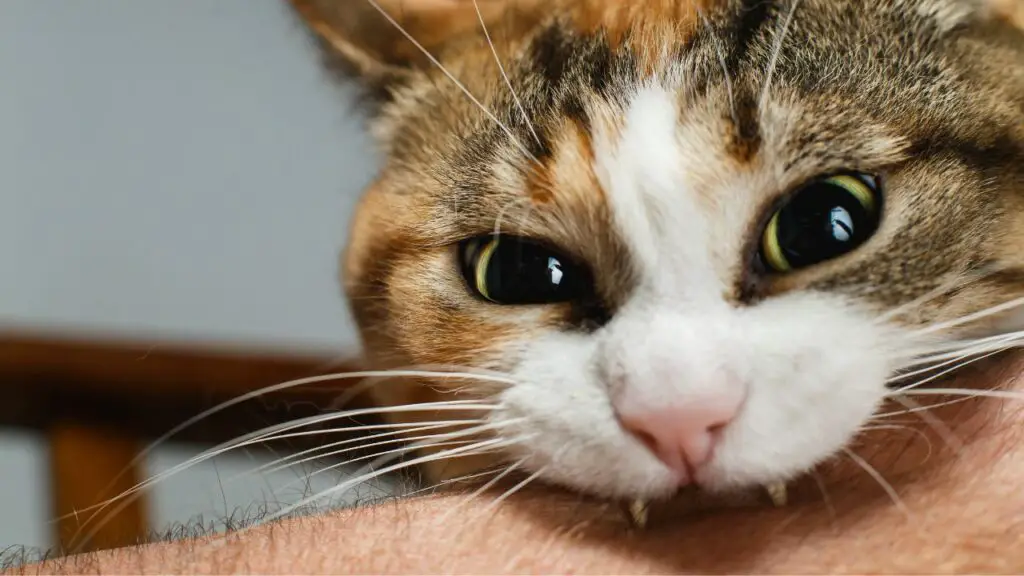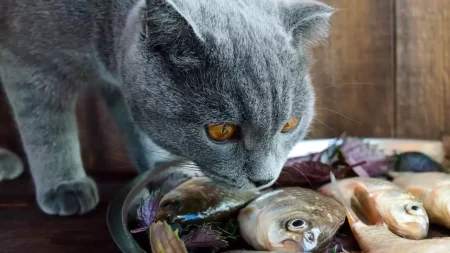Cats do not have venom. However, cat scratches can result in infections, especially when neglected.
The bacteria Bartonella henselae causes cat scratch disease, which may lead to swelling, soreness, and fever.
Seeking medical care when the infection is suspected is crucial.
Moreover, ensure a tetanus shot if an open wound is present and it has been over five years since the last vaccination.
Despite the ambiguity surrounding venom in cat scratches, they can pose risks if appropriate measures are overlooked.
What are the effects of a cat’s bite on humans?
A cat’s bite on humans can have various effects, depending on the severity of the bite and the presence of infection.
Some of the possible effects are:
Infection: Cat bites can introduce bacteria into the wound, such as Pasteurella multocida, Bartonella henselae (which causes cat scratch disease), or Capnocytophaga.
These bacteria can cause inflammation, pain, redness, swelling, pus, odor, and fever. Infection can occur as soon as 24 to 48 hours after the bite.
Complications: In addition to an infection, depending on the severity of the bite, the following complications could occur:
- Nerve damage
- Damage to tendons, particularly in the hands
- A broken fragment of the cat’s tooth could get stuck in the wound
- A scar at the site of the bite
Severe illnesses: In uncommon instances, feline bites might transmit grave ailments like rabies or toxoplasmosis.
Rabies is a lethal viral infection impacting the brain and nervous system. Toxoplasmosis is a parasitic infection potentially causing birth abnormalities in expectant mothers or serious sickness in those with weakened immune systems.
Upon experiencing a cat bite, promptly seek medical care to avert infection and complications.
Wash the wound using soap and water, apply pressure to stop bleeding, and protect it with a sterile bandage.
Antibiotics, a tetanus injection, or a rabies vaccine could be necessary based on the circumstances.
What types of cats are most likely to have venomous capabilities?
There are no types of cats that have venomous capabilities, meaning they cannot inject venom into their prey or enemies.
Nonetheless, certain cats harbor bacteria or diseases within their saliva or claws, potentially leading to infections or sickness in humans and other animals.
Notable hazardous cat breeds encompass:
Large wild cats: Tigers, lions, leopards, jaguars, and cougars fall into this category. As formidable predators, they possess the capacity to fatally wound humans using their piercing teeth and claws. Additionally, they may spread rabies or alternative diseases via their bites.
Black-footed cat: This is the smallest wild African cat breed, but also the deadliest. It has a hunting success rate of 60%, which means it kills more prey in a single night than other large cats do in months. It feeds on rodents and birds and can be very aggressive if threatened.
Bengal: This is a domestic cat breed that is a cross between a domestic shorthair and an Asian leopard cat. It has a wild appearance and a high prey drive. It can be loyal and affectionate to its owners, but also unpredictable and territorial. It can bite or scratch humans or other animals if provoked or bored.
Do cats produce venom in their saliva or in other parts of their body?
No, Cats do not generate venom from their saliva or other body parts.
Venom is a particular secretion that holds toxins and serves for defense or predation purposes.
Cats lack venom glands, as well as specialized teeth or claws for venom delivery.
Nonetheless, cats have bacteria in their saliva and claws that can induce infections in humans or other animals if bitten or scratched.
While not venomous, these bacteria can still be harmful.
Are there any anti-venom treatments for cat bites?
No, there are no anti-venom treatments for cat bites because cats do not have venom.
Anti-venom is a medication that nullifies venom effects from venomous animals like snakes, spiders, and scorpions.
In case of cat bites, medical attention is necessary to prevent infection and complications.
While anti-venom is not required, antibiotics, tetanus shots, or rabies vaccines may be needed depending on the situation.
It’s crucial to seek medical attention promptly if bitten by a cat.
Do domestic cats have the potential to develop venomous glands through selective breeding?
No, domestic cats do not have the potential to develop venomous glands through selective breeding.
Venomous glands are complex structures that require specific genes, enzymes, and adaptations to function.
They are not something that can be easily created or modified by artificial selection.
Domestic cats do not have any of the necessary components or evolutionary history to produce venom.
Selective breeding can only enhance or reduce existing traits, not create new ones.
Therefore, it is very unlikely that domestic cats will ever become venomous through selective breeding.
Are there any regions in the world where venomous cats are more common?
No, there are no regions in the world where venomous cats exist.
Cats lack venom glands and specialized teeth or claws for venom delivery, thus they are not venomous creatures nor part of any venomous classifications.
Nonetheless, certain regions may be home to more dangerous cat breeds, such as sizable wild cats or hostile domesticated cats.
These regions may be influenced by factors including habitat, climate, and human activity.







